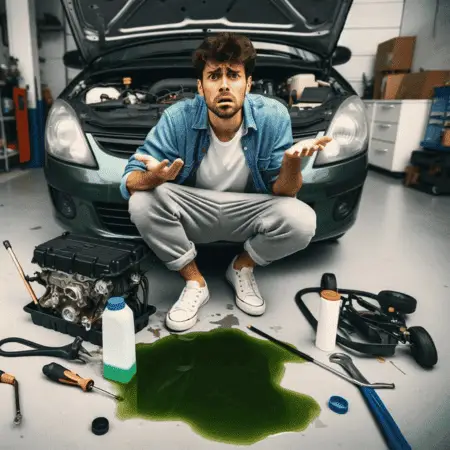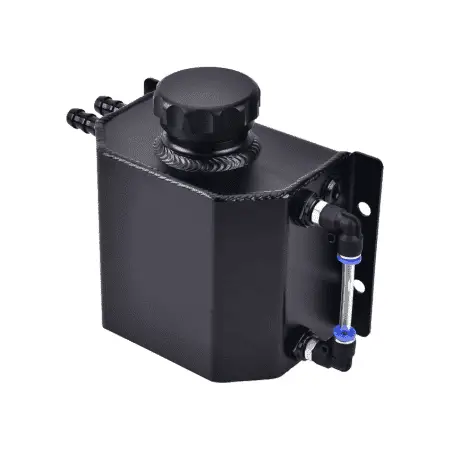Vehicles rely on a complex cooling system to maintain optimal performance and prevent overheating. One crucial component of this system is the coolant reservoir. The coolant reservoir, also known as the overflow or expansion tank, plays a vital role in the vehicle’s cooling system. It is a storage container for excess coolant, allowing for expansion and contraction as temperatures fluctuate during engine operation. This article will discuss the causes of why Coolant Reservoir keeps empty. So keep on reading,
Why Does My Coolant Reservoir Keep Emptying? If your coolant reservoir keeps emptying, it’s likely because of a few common reasons. There could be a leak in the cooling system, where the coolant is escaping. Check for wet spots under your car or around the hoses. The radiator cap, which helps maintain pressure, might be faulty or not sealing properly, causing the coolant to evaporate. Another possibility is a problem inside the engine, like a blown head gasket, allowing coolant to mix with oil or burn in the cylinders. Overheating or air bubbles in the cooling system could also lead to coolant loss.

signs of Coolant Reservoir Keep Emptying
Here are signs that the coolant reservoir keeps emptying:
1. Wet Spots Under Your Car: Look for any damp or wet spots underneath your vehicle. These wet areas may indicate a coolant leak. Check the ground where your car is usually parked for any signs of a puddle or wetness.
2. Inspect Hoses and Connections: Examine the hoses and connections in the engine compartment for visible issues. Cracked, worn, or loose hoses could be potential culprits for coolant leakage. Pay special attention to the areas around the radiator and water pump.
3. Check the Radiator Cap: A damaged or improperly tightened radiator cap may allow coolant to escape as steam or liquid. Inspect the cap for any visible signs of wear, and make sure it is securely tightened onto the radiator.
4. Monitor Engine Temperature: Keep an eye on your engine’s temperature gauge. If the engine consistently runs too hot, it could lead to the evaporation of coolant. Overheating is often a symptom of cooling system issues.
5. Look for White Exhaust Smoke: White smoke coming from your exhaust is a potential indicator of coolant being burned in the engine. This could point to a more serious issue, such as a blown head gasket. If you notice this, it’s crucial to address it promptly.
6. Sweet Smell from Exhaust: If you detect a sweet smell coming from your exhaust, it might be the odor of coolant. This can be associated with a blown head gasket or other internal engine problems. A distinct sweet smell is a red flag that should be investigated.
7. Regularly Check Coolant Levels: Consistently monitor the coolant levels in both the radiator and the coolant reservoir. A gradual decline in coolant levels without any visible external leaks could be indicative of an internal problem.
8. Inspect Reservoir for Cracks: Regularly inspect the condition of the coolant reservoir. Look for any cracks, damage, or visible issues. A damaged reservoir can lead to coolant loss and should be addressed promptly.
Causes Of Coolant Reservoir Keep Emptying
If you find that your coolant reservoir keeps emptying, it could be indicative of a few underlying issues. The coolant reservoir, also known as the expansion tank or overflow tank, plays a crucial role in maintaining the proper level of coolant in your vehicle’s cooling system.
Here are several potential reasons why your coolant reservoir might be consistently losing fluid:
1- Coolant Leak:
One of the most common reasons for a dropping coolant level is a coolant leak. Check for visible signs of leakage under the vehicle, around hoses, connections, and the radiator. Leaks can occur due to damaged hoses, a faulty radiator, a leaking water pump, or a damaged gasket.
2- Radiator Cap Issues:
The radiator cap is designed to maintain pressure in the cooling system. A faulty or loose radiator cap can lead to coolant loss. Inspect the cap for any visible damage and ensure it is securely tightened.
3- Internal Engine Issues:
An internal engine problem, such as a blown head gasket, can cause coolant to leak into the engine cylinders or mix with the oil. This can lead to a reduction in coolant levels in the reservoir. Look for signs of milky oil on the dipstick or a sweet smell from the exhaust, which may indicate a head gasket issue.
4- Overheating:
If your engine is frequently overheating, it can cause the coolant to evaporate or be expelled from the system. Check for any signs of overheating, such as a rising temperature gauge, steam coming from the engine, or a hot, bubbling coolant reservoir.
5- Air in the Cooling System:
Air pockets in the cooling system can prevent proper circulation of coolant, leading to overheating and a drop in coolant levels. Bleed the cooling system to remove any air pockets.
5- Faulty Coolant Reservoir:
The reservoir itself might have a crack or other damage that causes it to leak. Inspect the reservoir for any visible signs of damage or cracks.
6- Coolant Evaporation:
In some cases, small amounts of coolant can evaporate over time. However, if you notice a significant and consistent loss, it’s likely due to one of the aforementioned issues.
7- Incorrect Coolant Mixture:
Using an incorrect coolant-to-water ratio can affect the boiling and freezing points of the coolant. Ensure that you have the right coolant mixture for your vehicle.

how to fix Coolant Reservoir Keep Emptying problem
Fixing the issue of a coolant reservoir consistently emptying involves identifying the root cause and taking appropriate steps. Here’s a detailed guide on how to address this problem:
Locate and Fix External Leaks:
Inspect the engine bay, hoses, connections, radiator, and water pump for visible signs of leaks. If you find any, repair or replace the damaged components. Tighten loose hose clamps, and ensure a secure connection at all points.
Check and Replace the Radiator Cap:
Examine the radiator cap for any signs of damage or wear. If it is compromised, replace it with a new one with the correct pressure rating. Ensure the cap is securely tightened onto the radiator to maintain proper pressure in the cooling system.
Inspect for Internal Engine Issues:
If external leaks are ruled out, investigate potential internal engine issues. Check the oil on the dipstick for a milky appearance, which could indicate a blown head gasket. If this is the case, seeking professional assistance is crucial for a proper diagnosis and repair.
Monitor Engine Temperature:
Keep an eye on your vehicle’s temperature gauge while driving. If the engine consistently overheats, it could contribute to coolant loss. Address the root cause of overheating, such as a faulty thermostat, to prevent further coolant evaporation.
Bleed the Cooling System:
Air bubbles in the cooling system can hinder proper coolant circulation. Bleed the system to remove any trapped air. Follow your vehicle’s manual for specific instructions on how to bleed the cooling system.
Inspect and Replace a Faulty Coolant Reservoir:
Examine the coolant reservoir for cracks or damage. If the reservoir is compromised, replace it with a new one. Ensure that the replacement reservoir is compatible with your vehicle’s make and model.
Use the Correct Coolant Mixture:
Ensure that you are using the recommended coolant-to-water ratio for your vehicle. Using the wrong mixture can affect the coolant’s efficiency and lead to issues like overheating.
Consult a Professional Mechanic:
If the issue persists or if you are unable to identify the root cause, consult with a professional mechanic. They can perform a more thorough inspection, conduct diagnostic tests, and provide expert guidance on the necessary repairs.
Regular Maintenance:
Implement regular maintenance practices, including routine checks of the cooling system, to prevent future issues. Addressing any signs of coolant loss promptly can help avoid more extensive and costly repairs.
you may find helpful
- Benefits Of Removing Thermostat In A Car ( Pros And Cons )
- How To Clear Service Suspension System? Explained
- How To Start A Car With A Bad Crankshaft Sensor?
- What Happens If My Drive Shaft Breaks While Driving?
- Why Red Light Blinking In Car And What To Do
Conclusion
Maintaining a healthy coolant reservoir is crucial for the overall well-being of your vehicle. By understanding the common causes of coolant reservoir emptying and following preventive measures, you can ensure a reliable and efficient cooling system. Regular inspections, prompt interventions, and professional assistance when needed will keep your engine running smoothly.
